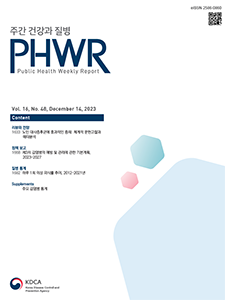Current Issue
Vol.16 No.48, December 14, 2023
-
Review & Perspective 2023-12-14
 0
0
 287
287
 141
141
Effective Interventions for Metabolic Syndrome in the Elderly: A Systematic Review and Meta-analysis
Seo-hyun Lee, Seul Goo, Yu-mi Seo, Sun-hwa Ban
Public Health Weekly Report 2023; 16(48): 1633-1667 https://doi.org/10.56786/PHWR.2023.16.48.1 Abstract
AbstractIn the Republic of Korea, the elderly population is increasing every year and, as we move toward becoming a super-aging society, it is of utmost importance to manage metabolic syndrome, which is the cause of chronic diseases in the elderly population. Metabolic syndrome can be considered a lifestyle disease and needs to be approached from various aspects, including diet, exercise, smoking cessation, and moderation in drinking. In order to reduce metabolic syndrome symptoms in the elderly population, a systematic literature review and meta-analysis were conducted focusing on domestic experimental studies developed so far. This study analyzed 17 intervention studies through a systematic literature review and meta-analysis conducted to integrate and analyze the results of experimental studies that identified the effects of intervention programs implemented on seniors aged 65 years or older on metabolic syndrome indicators. Exercise programs and complex interventions were analyzed. These exercises and combined interventions were confirmed to be effective on metabolic syndrome indicators such as blood pressure, neutral fat, high-density lipoprotein cholesterol, waist circumference, and fasting blood sugar. It was confirmed that an intervention lasting more than 12 weeks was more effective for metabolic syndrome indicators in the elderly than a 6-week intervention. Based on the results of this study, it can be used as basic data for the development of future intervention programs by reflecting effective factors in metabolic syndrome indicators in the elderly population.
-
Policy Notes 2023-12-14
 1
1
 601
601
 256
256
The 3rd Master Plan for the Prevention and Control of Infectious Disease, 2023-2027
Jin Ha, Moonsun Choi, Jiyeon Yoo
Public Health Weekly Report 2023; 16(48): 1668-1681 https://doi.org/10.56786/PHWR.2023.16.48.2AbstractMaster Plan for the Prevention and Control of Infectious Diseases is established every five years by the Commissioner of the Korea Disease Control and Prevention Agency in consultation with the Minister of Health and Welfare in accordance with Article 7 of the Infectious Diseases Control and Prevention Act. The 3rd Master Plan for the Prevention and Control of Infectious Diseases consists of 16 key tasks and 55 detailed tasks to be carried out over five years from 2023 to 2027 under four strategies: ‘Advance national preparedness for and response to infectious disease emergency’, ‘Respond with preemptive and comprehensive measures for infectious disease control and prevention’, ‘Reform infectious disease R&D’, ‘Solidify foundation for infectious disease response.’
-
QuickStats 2023-12-14
 0
0
 139
139
 155
155
Trends in the Proportion of People Who Eat Out More than Once a Day, 2012-2021
Public Health Weekly Report 2023; 16(48): 1682-1683 https://doi.org/10.56786/PHWR.2023.16.48.3

pp. 233~285
Most Keyword
?
What is Most Keyword?
- It is the most frequently used keyword in articles in this journal for the past two years.
Most Read
-
Management of Technology Development Efforts to Enhance the Healthcare Establishment’s Infection Response Capabilities
Misuk An, Hyeyoung Lee, Se-Jin Jeong, Hojin Lee, Sunkyung Baek
Public Health Weekly Report 2026;19: 1-12 https://doi.org/10.56786/PHWR.2026.19.1.1 -
Status and Future Tasks of the Regional Infectious Disease Specialized Hospital Establishment Project for Responding to Large-scale Emerging Infectious Disease Crises
Jeong-won Yeom, Hae-won Cho, Ju-hong Kim, Jong-hee Choi
Public Health Weekly Report 2026;19: 13-28 https://doi.org/10.56786/PHWR.2026.19.1.2
Editorial Office
+82-43-719-7569





 Full Text
Full Text Cite
Cite


